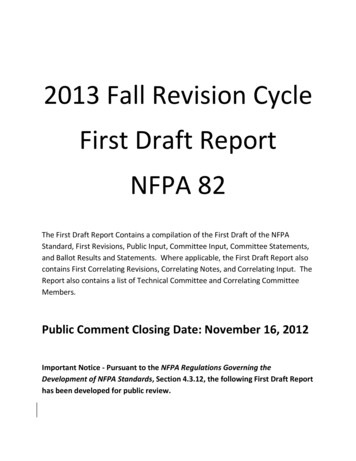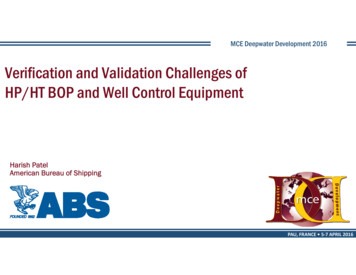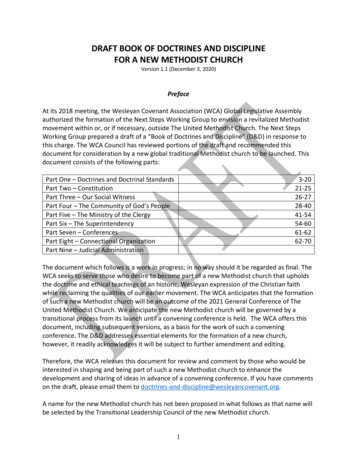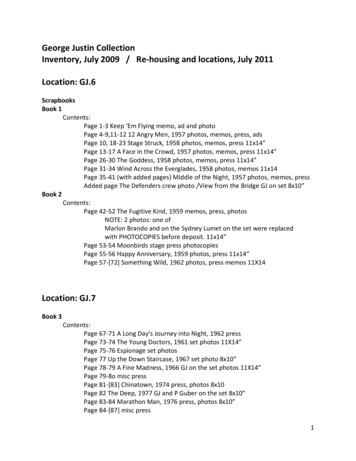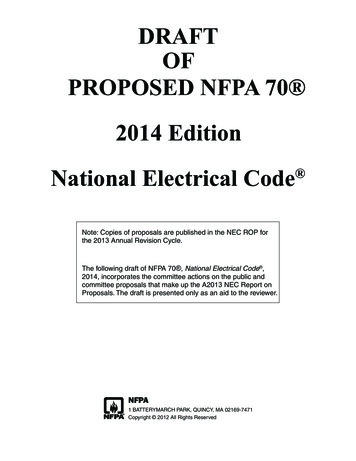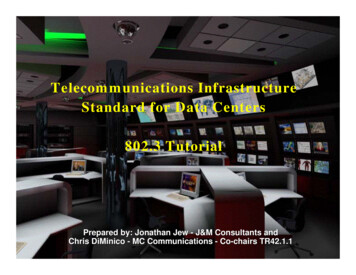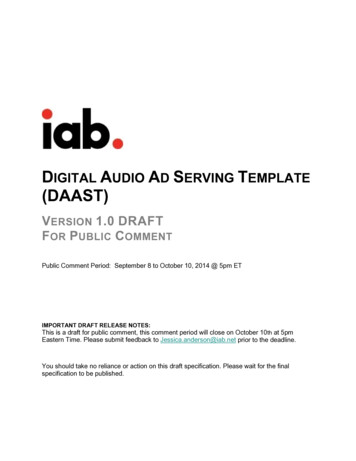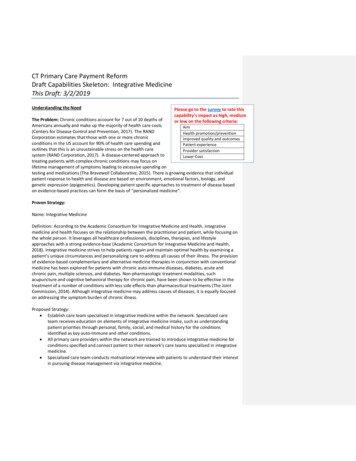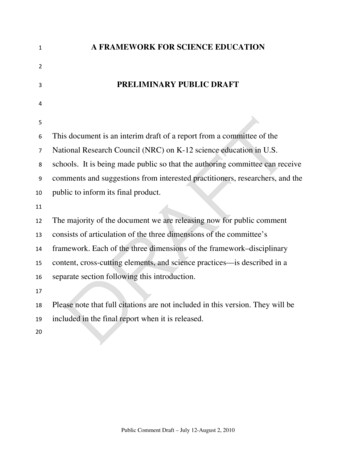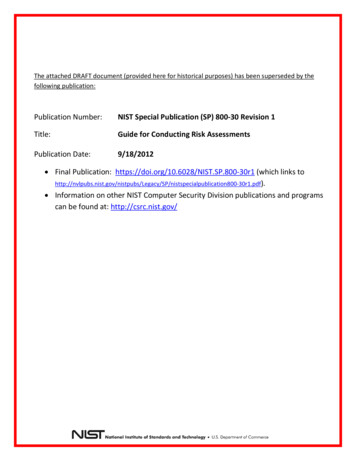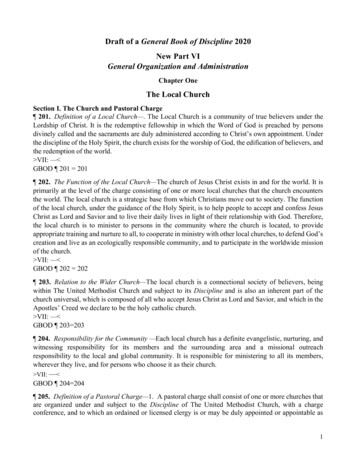
Transcription
Draft of a General Book of Discipline 2020New Part VIGeneral Organization and AdministrationChapter OneThe Local ChurchSection I. The Church and Pastoral Charge¶ 201. Definition of a Local Church—. The Local Church is a community of true believers under theLordship of Christ. It is the redemptive fellowship in which the Word of God is preached by personsdivinely called and the sacraments are duly administered according to Christ’s own appointment. Underthe discipline of the Holy Spirit, the church exists for the worship of God, the edification of believers, andthe redemption of the world. VII: — GBOD ¶ 201 201¶ 202. The Function of the Local Church—The church of Jesus Christ exists in and for the world. It isprimarily at the level of the charge consisting of one or more local churches that the church encountersthe world. The local church is a strategic base from which Christians move out to society. The functionof the local church, under the guidance of the Holy Spirit, is to help people to accept and confess JesusChrist as Lord and Savior and to live their daily lives in light of their relationship with God. Therefore,the local church is to minister to persons in the community where the church is located, to provideappropriate training and nurture to all, to cooperate in ministry with other local churches, to defend God’screation and live as an ecologically responsible community, and to participate in the worldwide missionof the church. VII: — GBOD ¶ 202 202¶ 203. Relation to the Wider Church—The local church is a connectional society of believers, beingwithin The United Methodist Church and subject to its Discipline and is also an inherent part of thechurch universal, which is composed of all who accept Jesus Christ as Lord and Savior, and which in theApostles’ Creed we declare to be the holy catholic church. VII: — GBOD ¶ 203 203¶ 204. Responsibility for the Community —Each local church has a definite evangelistic, nurturing, andwitnessing responsibility for its members and the surrounding area and a missional outreachresponsibility to the local and global community. It is responsible for ministering to all its members,wherever they live, and for persons who choose it as their church. VII: — GBOD ¶ 204 204¶ 205. Definition of a Pastoral Charge—1. A pastoral charge shall consist of one or more churches thatare organized under and subject to the Discipline of The United Methodist Church, with a chargeconference, and to which an ordained or licensed clergy is or may be duly appointed or appointable as1
pastor in charge or co-pastor. Where co-pastors are appointed, the bishop may designate foradministrative purposes one as pastor in charge.1 VII: 205.001 2. A lay person assigned by the bishop, upon recommendation of the cabinet, to do the work of ministry,is accountable to the district superintendent or another clergy appointed to oversee the charge, who willmake provision for sacramental ministry. The layperson assigned is also accountable to the policies andprocedures of the annual conference where assigned. VII: 205.002 GBOD ¶ 205.1 205.1; 205.2 205.41. See Judicial Council Decisions 113, 319Section II. Church Membership¶ 206. Eligibility—The United Methodist Church is a part of the holy catholic (universal) church, as weconfess in the Apostles’ Creed. All people may attend its worship services, participate in its programs,receive the sacraments and become members in any local church in the connection (¶ 4). VII: — GBOD ¶ 206 214¶ 207. Definition of Membership—1. The membership of a local United Methodist church shall includeall people who have been baptized and all people who have professed their faith.a) The baptized membership of a local United Methodist church shall include all baptized peoplewho have received Christian baptism in the local congregation or elsewhere, or whose membership hasbeen transferred to the local United Methodist church subsequent to baptism in some other congregation.b) The professing membership of a local United Methodist church shall include all baptizedpeople who have come into membership by profession of faith through appropriate services of thebaptismal covenant in the ritual or by transfer from other churches.2. For statistical purposes, church membership is equated to the number of people listed on theroll of professing members.3. All baptized or professing members of any local United Methodist church are members of theworldwide United Methodist connection and members of the church universal. VII: — GBOD ¶ 207.1-3 215.1-4¶ 208. Baptismal Covenant - 1. Christ constitutes the church as his body by the power of the Holy Spirit(1 Corinthians 12:13, 27). The church draws new people into itself as it seeks to remain faithful to itscommission to proclaim and exemplify the gospel. In baptism water is administered in the name of theTriune God by an authorized person. Baptism is the sacrament of initiation and incorporation into thebody of Christ. After baptism, the church provides the nurture that makes possible a comprehensive andlifelong process of growing in grace.Becoming a professing member requires the answer of faith of the baptized person made visiblein a service of profession of Christian faith and confirmation using the vows of the baptismal covenant.In the case of persons whose disabilities prevent them from reciting the vows, their legal guardian[s],themselves members in full covenant relationship with God and the Church, the community of faith, mayrecite the appropriate vows on their behalf.2. Baptism and Professing membership- a) Baptized infants and children are to be instructed andnurtured in the meaning of the faith, the rights and responsibilities of their baptism, and spiritual andmoral formation. Using the services of the baptismal covenant, youth will profess their faith, committhemselves to a life of discipleship, and be confirmed. Confirmation is both a human act of commitmentand the gracious action of the Holy Spirit strengthening and empowering discipleship.2
b) Youth and adults who have not been baptized and who are seeking to be saved from their sinsand profess Jesus Christ as their Lord and Savior are proper candidates for baptism in The UnitedMethodist Church. It is the duty of the congregation, led by the pastor, to instruct them in the meaningof baptism, in the meaning of the Christian faith, and in the history, organization, and teachings of TheUnited Methodist Church. After the completion of the period of nurture and instruction, the sponsor(s)and pastor shall bring the candidates before the congregation and administer the services of BaptismalCovenant, in which people are baptized, confirmed, and received into the Church. VII: 208.001 3. Ongoing Formation in the Baptismal Covenant- a) Formation in the baptismal covenant and inthe call to ministry in daily life is a lifelong process and is carried on through all the activities that haveeducational value. It focuses attention upon the meaning of discipleship and the need for members to bein mission in all of life’s relationships.b) There are many occasions as people mature in the faith when the Holy Spirit’s confirming actionmay be celebrated, such as in the reaffirmation of the baptismal covenant or other services related to lifepassages. Unlike baptism, which is a once-made covenant and can only be reaffirmed and not repeated,confirmation is a dynamic action of the Holy Spirit that can be repeated. VII: — GBOD ¶ 208.1 216.1 214; 208.2 216, 1 a b; 208.3 216.2¶ 209. Professing Membership - 1. When persons unite as professing members with a local UnitedMethodist church, they profess their faith in God, the Father Almighty, maker of heaven and earth; inJesus Christ his only Son, and in the Holy Spirit. Thus, they make known their desire to live their dailylives as disciples of Jesus Christ.2. They covenant together with God and with the members of the local church to keep the vowswhich are a part of the order of confirmation and reception into the Church:a) To renounce the spiritual forces of wickedness, reject the evil powers of the world, and repentof their sin;b) To accept the freedom and power God gives them to resist evil, injustice, and oppression;c) To confess Jesus Christ as Savior, put their whole trust in his grace, and promise to serve himas their Lord;d) To remain faithful members of Christ’s holy church and serve as Christ’s representatives inthe world;e) To be loyal to Christ through The United Methodist Church and do all in their power tostrengthen its ministries;f) To faithfully participate in its ministries by their prayers, their presence, their gifts, theirservice, and their witness;g) To receive and profess the Christian faith as contained in the Scriptures of the Old and NewTestaments. VII: — GBOD ¶ 209.1-2 217.Intro 1-7¶ 210. Growth in Faithful Discipleship—Faithful membership in the local church is essential for personalgrowth and for developing a deeper commitment to the will and grace of God. As members involvethemselves in private and public prayer, worship, the sacraments, study, Christian action, systematicgiving, and holy discipline, they grow in their appreciation of Christ, understanding of God at work inhistory and the natural order, and an understanding of themselves.3
VII: — GBOD ¶ 210 218¶ 211. Mutual Responsibility—Faithful discipleship includes the obligation to participate in the corporatelife of the congregation with fellow members of the body of Christ. A member is bound in sacredcovenant to shoulder the burdens, share the risks, and celebrate the joys of fellow members. A Christianis called to speak the truth in love, always ready to respond to conflict in the spirit of forgiveness andreconciliation. VII: — GBOD ¶ 211 219¶ 212. The Call to Ministry of All the Baptized—All members of Christ’s universal church are called toshare in the ministry which is committed to the whole church of Jesus Christ. Therefore, each memberof The United Methodist Church is to be a servant of Christ on mission in the local and worldwidecommunity. This servanthood is performed in family life, daily work, recreation and social activities,responsible citizenship, the stewardship of property and accumulated resources, the issues of corporatelife, and all attitudes toward other persons. Members are to engage in disciplined, covenant or classmeetings to foster their missional involvement and to witness for Christ, serving as a living examplein society while addressing injustice and suffering in the world and taking action which helps exemplifythe hope and promise of Christ. VII: — GBOD ¶ 212 220¶ 213. Lay Servant Ministries- Each central conference may create categories of servant ministries forlay persons which are appropriate and needed for the expanding and ongoing mission and ministry ofthat conference. Educational, spiritual, and psychological qualifications and provisions for appropriatecertification may be defined by the central conference. Jurisdictional conferences shall follow theprocedures in Part VII of the Discipline. VII: 213.001-213.004 GBOD ¶ 213 266 new¶ 214. Membership Records. – 1. Each local church shall accurately maintain:a) Membership records for each baptized or professing member including:(1) the person’s name, date of birth, address, place of birth, date of baptism, officiating pastor,and sponsors;(2) date of confirmation/profession of faith, officiating pastor, and sponsors;(3) if transferred from another church, date of reception, sending church, and receiving pastor;(4) if transferred to another church, date of transfer, receiving church, and address of receivingchurch;(5) date of removal or withdrawal and reason;(6) date of restoration of professing membership and officiating pastor;(7) date of death, date and place of funeral/memorial, place of burial, and officiating pastor.b) Constituency Roll, containing the names and addresses of such persons as are not members ofthe church concerned, including unbaptized children, youth and adults whose names are not on themembership record, and other nonmembers for whom the local church has pastoral responsibility.c) Affiliate Membership Roll.d) Associate Membership Roll.4
2. In the case of a union or federated church with another denomination, the governing body ofsuch a church may report an equal share of the total membership to each judicatory, and such membershipshall be published in the minutes of each church, with a note to the effect that the report is that of a unionor federated church, and with an indication of the total actual membership. VII: 214.001-214.003 GBOD ¶ 214.1a 230.1; 214.1b-d 2 230.3-6¶ 215. Transfer from Other Denominations—A member in good standing in any Christian denominationwho has been baptized and who desires to unite with The United Methodist Church shall be received aseither a baptized or a professing member. Such a person may be received as a baptized member by aproper certificate of transfer from that person’s former church or some certification of Christian baptismand as a professing member upon taking vows declaring the Christian faith through appropriate servicesof the baptismal covenant in our ritual. The pastor will report to the sending church the date of receptionof such a member. It is recommended that instruction in the faith, ministry, and polity of the Church beprovided for all such persons. Persons received from churches that do not issue certificates of transfer orletters of recommendation shall be listed as “Received From Other Denominations.” VII: — GBOD ¶ 215 225¶ 216. Affiliate and Associate Membership - 1. A professing member of The United Methodist Church,of an affiliated autonomous Methodist or united church, or of a Methodist church that has a concordatagreement with The United Methodist Church, who resides for an extended period in a city or communityat a distance from the member’s home church, may on request be enrolled as an affiliate member of aUnited Methodist church located in the vicinity of the temporary residence. The home pastor shall benotified of the affiliate membership. Such membership entitles the person to the fellowship of that church,to its pastoral care and oversight, and to participation in its activities, including the holding of office;except such as would allow one to vote in a United Methodist body other than the local church. However,that person is counted and reported as a professing member of the home church only.2. A member of another denomination may become an associate member under the sameconditions, but may not become a voting member of the church council.23. Affiliate or associate relationship may be terminated at the discretion of the United Methodistchurch in which the affiliate or associate membership is held whenever the affiliate or associate membershall move from the vicinity of the United Methodist church in which the affiliate or associatemembership is held. VII: — GBOD ¶ 216.1-3 2272. See Judicial Council Decision 372.¶ 217. Accountability—1. All members are to be held account-able for faithfulness to their covenant ofbaptism.2. If a baptized member neglects faithfulness and discipline in terms of the baptismal covenant,every means of encouraging that member to return and of nurturing him or her to assume the vows ofprofessing membership should be made.3. If a professing member should be accused of violating the covenant and failing to keep theconfirmation vows, then it is the responsibility of the local church, working through its pastor and its5
units, to minister to that member in compliance with the provisions of ¶ 220 in an effort to enable themember to faithfully perform the vows and covenant of membership. VII: 217.001 GBOD ¶ 217.1-3 221.1-3¶ 218. Annual Membership Report and Audit—1. The pastor shall report to the charge conferenceannually the names of persons received into the membership of the church or churches of the pastoralcharge and the names of persons removed since the last charge conference, indicating how each wasreceived or removed. The church council shall appoint a committee to audit the membership record,submitting the report annually to the charge conference. VII: 218.001 2. In central conferences, the membership records in each local church shall be according to acommon format prepared by the General Council on Finance and Administration in cooperation with thecentral conferences. Jurisdictional conferences shall follow the procedures in Part VII of the Discipline. VII: 218.002 GBOD ¶ 218.1 231; 218.2 233/newSection III. Care of Members¶ 219. Care of Children and Youth—1. Because the redeeming love of God revealed in Jesus Christextends to all persons, and because Jesus explicitly included the children in his kingdom, it is theresponsibility of the pastor of each charge to counsel Christian parents or guardians in the meaning ofbaptism for children and youth of all ages, and of the significance of the vows for themselves and thelocal church. This includes active participation in the life of faith in the local church to prepare everyonefor lifelong membership in Christ’s Church. At least one parent or guardian shall be a member of aChristian church; or sponsor(s) or godparent(s) who are members renewing their own baptismal vows.All members of the local church likewise will assist and encourage the nurture of each child or youth.2. The pastor of the church shall, at the time of administering the sacrament of baptism, furnishthe parent(s), guardian(s), sponsor(s), or godparent(s) of the child who is baptized with a certificate ofbaptism, which also clearly states that the child is now a baptized member in The United MethodistChurch. Appropriate records of the sacrament of baptism shall be maintained and kept at the local churchor another appropriate location. VII: 219.001 3. The membership record shall be regularly reviewed to identify those who have not becomeprofessing members, for purposes of nurturing them toward profession of faith. VII: 219.002 GBOD ¶ 219.1 226.1; 219.2 226.2a b; 219.3 226.3¶ 220. Care of Adult Members— 1. The local church shall endeavor to enlist each member in activitiesfor spiritual growth and in participation in the services and ministries of the Church and its organizations.It is the duty of the pastor and of the members of the church council by regular visitation, care, andspiritual oversight to provide necessary activities and opportunities for spiritual growth throughindividual and family worship and individual and group study to connect faith and daily living, andcontinually to aid the members to keep their vows to uphold the Church by their prayers, presence, gifts,service, and witness. The Church has a moral and spiritual obligation to nurture its nonparticipating andindifferent members and to lead them into an active church relationship.2. The pastor in cooperation with the church council may arrange the membership in groups—with a leader for each group—designed to involve the membership of the Church in its ministry to the6
community. Such groups may be especially helpful in evangelistic outreach by contacting newcomersand unreached persons, by visitation, by mobilizing neighbors to meet social issues in the community,by responding to personal and family crises, by holding prayer meetings in the homes, by distributingChristian literature, and by other means. VII: 220.001 GBOD ¶ 220.1 228.1; 220.2 228.2a¶ 221. Review in Case of Neglect – 1. While primary responsibility and initiative rests with eachprofessing member to faithfully perform the vows of the baptismal covenant that have been solemnlyassumed, if the member should be neglectful of that responsibility, the following procedures shall beimplemented:2. Membership records are reviewed regarding the active participation of all professing membersresiding in the community. Inactive members are requested to do one of four things:a) reaffirm the baptismal vows and return to living in the community of the baptismal covenantin the church where the member’s name is recorded,b) request transfer to another United Methodist church where the member will return to living inthe community of the baptismal covenant,c) arrange transfer to a particular church of another denomination, ord) request withdrawal.3. If a professing member whose address is known is residing outside the community and is notparticipating in the worship or activity of the church, the directives to encourage a transfer of the membershall be followed or that member may requests in writing that the name be removed from the roll ofprofessing members.4. If the address of a professing member is no longer known to the pastor, every effort shall bemade to locate the member. If the member can be located, the directives of either §2 or §3 above shallbe followed.5. If the directives of §2, §3, or §4 above have been followed over a period of two years withoutsuccess, the member’s name may be removed as a professing member by vote of the charge conferenceon recommendation of the pastor. On the membership record there shall be entered after the name:“Removed by Charge Conference Action”; and if the action is on the basis of §4 above, there shall beadded: “Reason: Address Unknown.” The record shall be retained in order that upon reaffirmation of thebaptismal covenant the person may be restored as a member. Should a transfer of membership berequested, the pastor may, after consultation with the person, issue the certificate of transfer. VII: 221.001 GBOD ¶ 221.1-5 228.2b(1)-(4)¶ 222. Transfer of Members – 1. Transfer to Other United Methodist Churches—When a pastor receivesa request for a transfer of membership from a member or from the pastor of another United Methodistchurch or a district superintendent, that pastor shall send the proper certificate directly to the pastor ofthe United Methodist church to which the member is transferring, or if there is no pastor, to the districtsuperintendent. On receipt of such a certificate of transfer, the pastor or district superintendent shallenroll the name of the person so transferring after public reception in a regular service of worship, or ifcircumstances demand, public announcement in such a service. The pastor of the church issuing the7
certificate shall then be notified, whereupon said pastor shall remove the member from the roll. VII: 222.001 2. Transfer to Other Denominations—A pastor, upon receiving a request from a member totransfer to a church of another denomination, shall properly record the transfer of such person on themembership record of the local church. Upon request of the member, the pastor shall hand a certificateof transfer to the member. VII: 222.002 3. Transfer from Discontinued Local Churches- If a local church is discontinued, the districtsuperintendent shall select another United Methodist church and transfer its members thereto, or to such otherchurches as the members may select.GBOD ¶ 222.1 239; 222.2 240; 222.3 229¶ 223. Withdrawal Without Notice—If a pastor is informed that a member has without notice united witha church of another denomination, the pastor shall make diligent inquiry and, if the report is confirmed,shall enter “Withdrawn” after the person’s name on the membership roll and shall report the same to thenext charge conference. VII: — GBOD ¶ 223 241¶ 224. Restoration of Professing Membership—1. A person whose name has been removed fromprofessing membership by withdrawal, or action by charge conference, or trial court, may ask to berestored to membership in the local church.2. A person whose membership was recorded as having been withdrawn, for any voluntary reasonmay be restored to professing membership by reaffirmation of the baptismal vows.3. A person who withdrew under charges or was removed by trial court may ask to return to thechurch. Upon evidence of a renewed life, approval of the charge conference, and reaffirmation of thebaptismal vows, the person may be restored to professing membership. VII: — GBOD ¶ 224.1 2 242.1 2; 224.3 242.5Section IV. Organization of the Local Church¶ 225. Primary Tasks—In carrying out its primary task, the local church shall be organized so that adequate provision is madefor these basic responsibilities:(1) planning and implementing a program of nurture, outreach, and witness for persons and familieswithin and without the congregation;(2) providing for effective pastoral and lay leadership;(3) providing for financial support, physical facilities, and the legal obligations of the church;(4) utilizing the appropriate relationships and resources of the district and annual conference;(5) providing for the proper creation, maintenance, and disposition of documentary record material ofthe local church; and(6) seeking inclusiveness in all aspects of its life. VII: — GBOD ¶ 225 2438
¶ 226. Organization— 1. The basic organizational plan for the local church shall include provision forthe following units: a charge conference, a church council, a committee on nominations and leadershipdevelopment, a committee on pastor-parish relations, a committee on finance, a board of trustees unlessotherwise required by civil law, and such other elected leaders, commissions, councils, committees, andtask forces as the charge conference may determine. Every local church shall develop a plan fororganizing its administrative and programmatic responsibilities. VII: 226.001 2. The church council and all other administrative and programmatic structures of the localchurch shall be amenable to the charge conference. The church council shall function as the executiveunit of the charge conference.3. When circumstances so require, the charge conference may, in consultation with and uponthe approval of the district superintendent, modify the organizational plans, provided that the provisionsof ¶ 225 are observed. VII: 226.002 4. Members of the church council or alternative structure shall be persons of genuine Christiancharacter who love the church, are morally disciplined, are committed to the mandate of inclusiveness inthe life of the church, are loyal to the ethical standards of The United Methodist Church set forth in theSocial Principles, and are competent to administer its affairs. It shall include youth and young adultmembers chosen according to the same standards as adults. All persons with vote shall be members ofthe local church, except where central conference legislation provides otherwise. The pastor shall be theadministrative officer and, as such, shall be an ex officio member of all conferences, boards, councils,commissions, committees, and task forces, unless otherwise restricted by the Discipline.35. Central conferences shall establish provisions, or delegate such authority to their respectiveannual conferences, for organizing a new church or a new charge, provided that the organizing of a newlocal church within a charge shall be subject at least to the agreement of the superintendent and of saidcharge conference, and that the organizing of a new charge shall be subject at least to the agreement ofthe cabinet of the annual conference. All such newly organized churches shall be in accordance withlocal laws and other provisions of the Discipline.Jurisdictional conferences shall follow the procedures in Part VII of the Discipline. VII: 226.003 6. Central conferences may establish provisions for ministry groups, units or institutional workon the level of the local church as it best serves the mission of the church, or delegate such authority totheir respective annual conferences. Jurisdictional conferences shall follow the procedures in Part VII ofthe Discipline. VII: 226.004-226.007 GBOD ¶ 226.1-2 244Intro 1; 226.3 247.2; 226.4 244.3; 226.5 259; 226.6 new3. See Judicial Council Decisions 469, 500.¶ 227. Transfer of a Local Church - A local church may be transferred from one annual conference toanother in which it is geographically located by a two-thirds vote of the professing members who arepresent and voting in each of the following: (1) the charge conference, (2) a congregational meeting ofthe local church affected, and (3) each of the two annual conferences involved. Upon announcement ofthe required majorities by the bishop or bishops involved, the transfer shall immediately be effective.The votes required may originate in the local church or either of the annual conferences involved andshall be effective regardless of the order in which taken. VII: 227.001 GBOD ¶ 227 260Section V. The Charge Conference9
¶ 228. General Provisions—1. Within the pastoral charge the basic unit in the connectional system ofThe United Methodist Church is the charge conference. The charge conference shall therefore beorganized from the church or churches in every pastoral charge as set forth in the Constitution (¶ 43). Itshall meet at least annually.2. The membership of the charge conference shall be all members of the church council or otherappropriate body, together with retired ordained clergy who elect to hold their membership in said chargeconference and any others as may be designated in the Discipline, and other persons as elected by thecharge conference. If more than one church is on the pastoral charge, all members of each church councilshall be members of the charge conference.3. The district superintendent shall fix the time of meetings of the charge conference. The chargeconference shall determine the place of meeting.4. The district superintendent shall preside at the meetings of the charge conference or maydesignate an elder to preside.5. The members present and voting at any duly announced meeting shall constitute a quorum.6. Special sessions may be called by the district superintendent after consultation with the pastorof the charge. The purpose of such special session shall be stated in the call, and only such business shallbe transacted as is in harmony with the purposes stated in the call. Any such special session of the c
Draft of a General Book of Discipline 2020 New Part VI General Organization and Administration Chapter One The Local Church Section I. The Church and Pastoral Charge ¶ 201. Definition of a Local Church—. The Local Church is a
